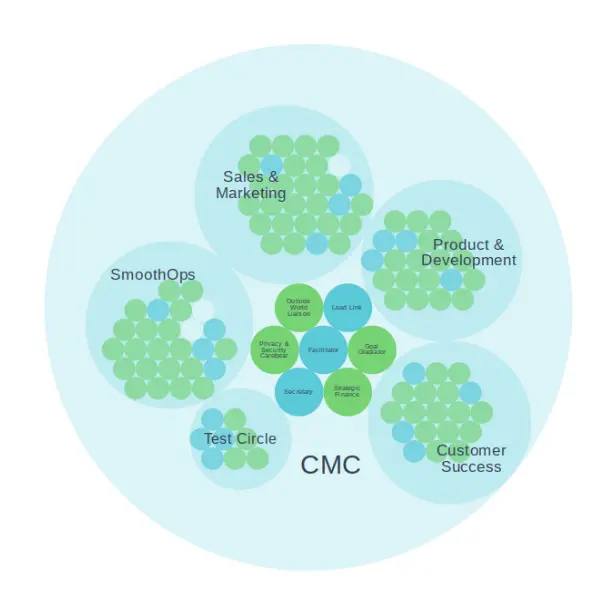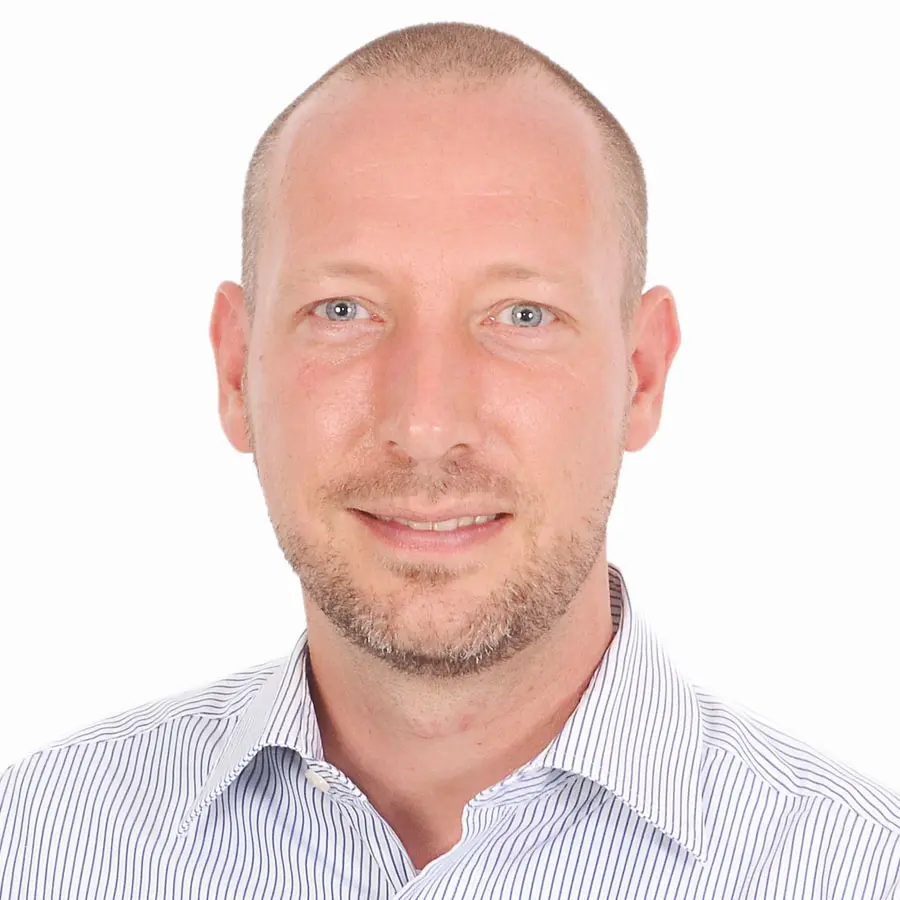Learning to Trust as a CEO
How Holacracy helped me “fire” myself from the role of traditional CEO and learn to let go.
How Holacracy helped me “fire” myself from the role of traditional CEO and learn to let go.

Just a few years ago I was asked, on a Friday night, to approve a Converter’s decision to buy a software tool. I thought it was so silly: having to approve buying a tool that cost less than $50 a month. I’ve written and talked about this journey in detail, but in short, it set me on a course to self-management with Holacracy.
Fast forward to 2019, and Convert is a fully Holacracy-powered organization. And I no longer have to give greenlights to small decisions–or the many others, big and small– that Converters make.
By adopting Holacracy at Convert, we’re running a self-managed company with thirty-five people, working remotely from all over the world. Converters represent many different nationalities, speak different languages, and we work in different timezones.
Embracing Holacracy has empowered every Converter to move fast, even with the barriers remote work can present. It has decentralized the decision-making power at Convert, and Converters make decisions without having to wait for the CEO (me!) to confirm if they can buy a certain tool — or anything, for that matter–that their role has power over.
Each Converter knows what their role empowers them to do, and they know I trust them to do the right thing. Converters choose how to use their time and work toward the purpose of the company, their circle, and their roles. And productivity is measured by what they produce — not how many hours they sit glued to their desks.

Holacracy didn’t just help me fire myself from the role of traditional CEO, but also helped grow our team, and our revenue by about 40%-60% year-over-year. But this didn’t happen overnight.
We built our Holacracy practice at Convert one block at a time. From redoing how we hired and worked, to rethinking how we approached processes, our Holacracy Bootstrapper (a role at Convert) literally bootstrapped the Holacracy way of working at Convert. Getting here was a long journey, that started long before Convert even existed.
I was yelling at a freelance developer: “You’ve made no progress this week. Does this simple task feel too much to you?” (Well, this was happening via a chat, so the yelling was more like an all-caps avalanche.)
That was it. I hit the “Terminate Contract” button and gave a low rating. Goodbye, freelancer from wherever!
This was the lowest point I had hit in my business. I wasn’t hiring the right people. I was failing to connect with those I hired. And I went about doing one-click sacking.
But meeting one special freelancer changed everything.
Claudiu, from a Romanian University, picked up the project of making a WordPress plugin for $50. He always agreed to my requests and tried to make them work, but also pushed back when things were difficult or costly in terms of time or money. Claudiu’s pushback got him a special status. I started sending him more and more projects, and after just a few months, he had the login details of my servers. Being able to share such data with a freelancer I hadn’t even met showed me that I could let go. That I could trust.
But that trust didn’t come without fears. In fact, I often shared with Claudiu my fears of him having so much access. And doing so also made me realize that I could express a more vulnerable me. After another business and a few years, I flew to Romania to sign an agreement to make Claudiu the co-founder and CTO of the company we now both own: Convert.
I learned that I could trust people and let go of the control I held so tightly. I realized that if I could trust even five people to do just 80% of the work according to my specs, that would result in 400% productivity compared to the 100% of just mine. I now know that the math is total nonsense, but the idea of trusting people to move more work forward, and to do it faster, stayed with me.
With Holacracy practice, this idea became reality at Convert. Today, I trust every Converter to do their jobs right and according to their own specs. I also trust them with even the most critical business functions.
In fact, just last year, we hired two awesome people to manage our legal and financial matters. Before that, I had handed over the administrative control of more than seventy software apps to another role. None of this could have happened without investing trust in people.
For me, the hardest part of moving away from a traditional model to one like Holacracy is when things are done in a way that I wouldn’t allow in a hierarchy. Take the priorities people set for themselves as an example. Since I don’t know all the details about their projects, I have to trust that they have their priorities right, even if they seem off to me.
Sometimes I have to step back, see if it really worries me, and then sit with that idea for a minute. And if I still think it’s a mistake, I have to ask the context of their actions before I judge. That is really hard for an impulsive person like me, but I’m putting this in the “to learn” category for now.
I’m a person who loves structure. Ever since I read Tim Ferriss’ book The 4-Hour Workweek, I have designed my entire business around processes; processes that micromanaged and that I considered to be perfect. And because you can’t improve upon perfection, my processes became the be-all and end-all. But Holacracy practice changed this. Now, Converters have the freedom to modify processes as long as end goals are reached.
Adding flexibility to the processes I believed to be perfect didn’t come easily to me, but it showed me that if we make the effort and trust people, we can work differently from our stubborn selves. Besides, this is also essential for successful Holacracy practice, as adhering to processes are a cornerstone for adopting Holacracy well.
For the longest time, I created manuals and videos and hoarded company information so I could manage the “secret formula” of the business. I did this in a way so that no team or individual would be able to access all the business data at any given time. Splitting up the processes and business over many people, usually freelancers in some far away country that I felt no connection to, felt like a safe way to go about running the business.
It was all about ME: my business, my process, and my success!
The results, as you can imagine, were pretty limited. But now with Holacracy, we operate almost like an open company where all our core members have access to everything about Convert. And every Monday, every Converter provides an update, sharing what they worked on, what worked or what didn’t work that well. We’ve woven transparency into the very way we work.
Encouraging transparency helps us build an environment that’s free of fear. Failures aren’t seen as failures, but as opportunities — and are visible to everyone, so others feel motivated to share theirs as well. Successes are celebrated openly. We also have open discussions when considering a potential customer about whom we’re unsure.
This journey towards trust and transparency has been worth it. But the truth is that running with Holacracy is hard. I assume it’s easier when your employees are all in one location. But for a remote team like Convert, I’ve found it to be really, really difficult.
I think it’s the same kind of journey a parent takes during the first twenty-one years of the life of their child. You are full of expectations, and then you learn that it takes a year before they can even walk, and another year and a half before they can run decently. But then you realize that it’s as much of a journey for them as it is for you. They show their independence and you have to learn to give them their space; only when you’ve done so do they feel they can come to you with confidence when they get stuck.
Just as not all people choose to have children, many organizations don’t choose to adopt Holacracy. And honestly, it isn’t for everyone. It’s only for the leaders that believe in Teal organizations where you work on a purpose to make things better, who believe in the fundamental good of people and that they will do the right thing with the structure they are given. I believe now, more than ever, that if you give trust, you’ll get it back.
At Convert, we have a purpose we’re working towards. We’ve chosen our causes, and we feel empowered using Holacracy practice to get to where we want to be. Together, we all decide which customers to work with — and which to turn down, if they don’t align with our values.

We’re far from perfect, but working where the carrots and sticks of the motivational world don’t exist means that real connections with real people are valued. Our interactions with our colleagues are personal and we really connect. Often, the members of our fully remote team turn into friends who actually visit each other, even across different continents.
I wish you could experience what we, as members of Convert, experience. It’s not easy to get here, but it’s well worth it. Trust me.
To learn more about self-management, join a community of pioneers and check out our e-courses → Self-Management Accelerator
